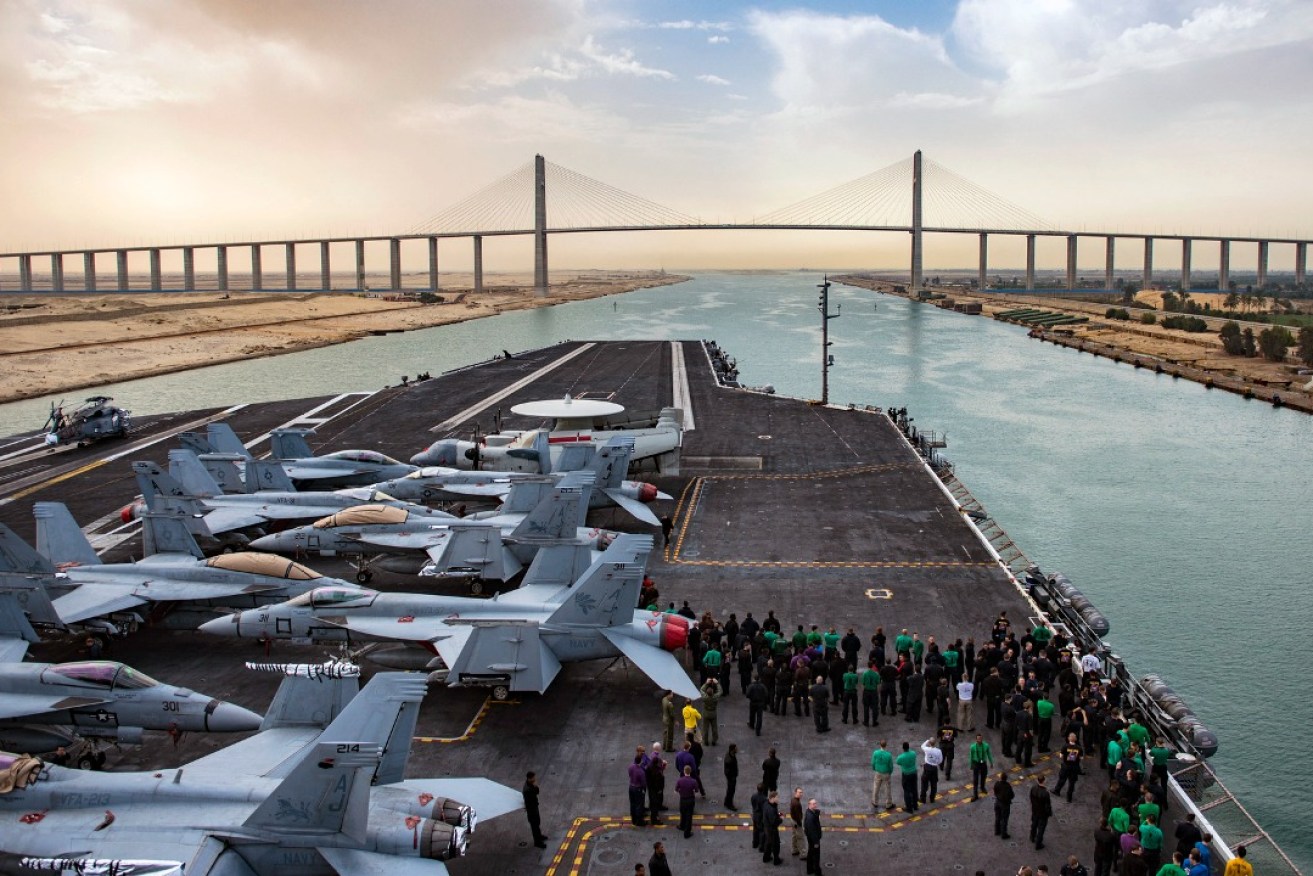Australia not part of Red Sea naval taskforce
Australia has been left off a list of nations sending warships to patrol the Red Sea as part of a US-led taskforce to protect commercial shipping under threat from pro-Palestine Yemeni rebels – despite a US Navy request for Australia to be included.

US aircraft carrier USS Dwight D. Eisenhower transits the Suez Canal. Photo: AAP
The United States yesterday said the United Kingdom, Bahrain, Canada, France, Italy, the Netherlands, Norway, Seychelles and Spain were part of a new security operation dubbed “Operation Prosperity Guardian” which would conduct joint patrols in the southern Red Sea and the adjacent Gulf of Aden.
US Secretary of Defence Lloyd Austin announced the naval taskforce, saying Houthi rebel attacks on Red Sea shipping were “an international challenge that demands collective action”.
Australia was not included on the list. On Thursday last week, Defence Minister Richard Marles said the federal government had yet to respond to a US request to send a naval vessel to the region.
“We’ll consider this request in due course, but I would note that the focus of our naval efforts right now are on our immediate region,” he said.
“In all of the decisions that we make, Australia’s national interests will be front and centre.”
Attacks by Yemeni Houthi rebels have forced major shipping companies to reroute, stoking fears of sustained disruptions to global trade.
The Iran-aligned militant group, which controls vast amounts of territory in Yemen after years of war, has since last month fired drones and missiles at international vessels sailing through the Red Sea.
The Houthis said its attacks were a response to Israel’s assault on the Hamas-ruled Gaza Strip and in a statement late on Tuesday said it only targeted Israeli ships or ships heading into Israeli ports.
But it accused the new US-led task force of being “part of the aggression against Gaza and the Palestinian people”.
Mohammed Ali al-Houthi, a senior Houthi official, told Iranian TV on Tuesday that any country acting against Houthi forces would see its ships targeted in the Red Sea.
This week, the attacks began to take a toll on global trade, disrupting a key trade route that links Europe and North America with Asia via the Suez Canal.
Oil major BP paused all Red Sea transits and a slew of top shipping firms including Maersk started diverting shipments normally made through Suez around the Cape of Good Hope on Africa’s southern tip.
The new route around Africa adds days to journey times and raises costs.
The list of companies avoiding the Red Sea continued to grow on Tuesday.
The crisis, which has grown out of the war between Israel and Palestinian group Hamas, is the latest in the Middle East to pit the United States and its allies against Iran and its regional Arab proxy militias.
Iranian proxies including the Houthis and Lebanese Hezbollah have fired rockets at Israel since the conflict began.
But it was unclear how many other countries are willing to do what mostly US warships have done in recent days – shoot down Houthi missiles and drones, and rush to the aid of commercial ships under attack.
A European diplomat whose country will take part in the task force said the idea of the operation was for participating countries’ ships to shoot down missiles and drones and accompany vessels through the Red Sea.
A US military official who spoke on condition of anonymity played down the idea that naval ships would escort commercial vessels, given that hundreds normally travel the route daily, but said the US operation would position ships in areas where they could have the greatest security benefit.
BP’s decision to temporarily pause all transit through the Red Sea and oil tanker group Frontline’s saying its vessels would avoid passage through the waterway showed that the crisis was broadening to include energy shipments.
Crude oil prices rose for a second straight day on Tuesday as the Houthi attacks on ships disrupted trade and more companies were forced to reroute vessels.
Many other ships were still plying the Red Sea, though several ships had armed guards onboard, LSEG data showed.
A number of container vessels were anchored and others turned off tracking systems as traders adjusted routes and prices in response to the maritime attacks.
– with AAP




